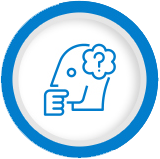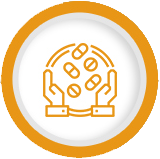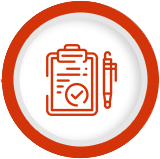Get a Clear Understanding of Dual Diagnosis
What is dual diagnosis?
Dual diagnosis is where you suffer from a substance abuse problem and a mental illness at the same time. You may receive a very general dual diagnosis, such as substance use disorders and depression, or it may be more specific such as a particular anxiety disorder and a heroin addiction.
If you are diagnosed with a dual diagnosis, it means you will have very specific signs and symptoms of both the addiction and the co-occurring mental disorder. In many cases, substance abuse can worsen pre-existing mental disorders, or substance abuse can trigger new mental disorders that you have not previously suffered.


Other names for dual diagnosis
Dual diagnosis is also referred to as dual pathology, co-morbid disorders, COD, and a simultaneous addiction and mental disorder.
Co-occurring Disorders
If you have a mental health disorder alongside a substance use disorder, you are referred to as having co-occurring disorders, or co-existing disorders.
The concept of co-occurring mental disorders became established more than two decades ago, but medicine in general is still not very good at treating addiction and mental disorders together. The concept of co-occurring disorders is very simple, but they are best treated in a specialist addiction environment.
Comorbidity
Comorbidity is when you have more than one mental disorder at the same time. You may be diagnosed with a major depressive disorder (MDD) and a generalised anxiety disorder (G A.D.). Co-morbid disorders are coexisting disorders, and in the example above, you would be described as having an anxiety disorder and a depressive disorder at the same time. There are other conditions that count in the comorbidity classification such as physical illnesses like cancer, cardiovascular disease, dementia and diabetes. There are certain mental disorders that often present together in a comorbid dynamic, including anxiety disorders, eating disorders and substance abuse disorders.
When you have several comorbid disorders and an addiction, the process of treatment needs to be extremely carefully planned to ensure that you have the best opportunity to enter a healthy recovery process, and have the tools to manage the challenges you face in your life.
Dual Disorders
Dual disorders tend to interact with each other but are seen as independent disorders. Dual disorders has been the term that has been generally accepted in psychiatry, mental health and addiction medicine to describe the situation where you experience a mental health disorder alongside an alcohol or drug use disorder.
- none Easy
- none Confidential
- none Lifetime Support
Common Dual diagnoses
Research suggests that around 50% to 70% of people who enter addiction rehab for drug or alcohol use disorders have a dual diagnosis or several comorbid disorders. If you have a mental health disorder and a substance addiction, then you are not alone, and there are lots of established research-backed treatments that can help you to live a productive life in society.
Every person that enters addiction treatment has their own unique mental make-up and psychological dynamic. If you have a dual diagnosis, then the co-occurring mental disorder will be treated specifically in therapy, and you will get individualised treatment to help you build a mental framework, thinking strategies and lifestyle choices that will help you have maximum physical and mental well-being.
With a dual diagnosis, there can be significant interaction between your addictive behaviours and the mental disorder, with one driving the other, all your mental disorders feeding each other and making the situation more difficult.
Below are six of the most common mental disorders that often accompany a substance use disorder:

Depression
Substance use disorder and depression is the most frequently seen dual pathology in rehab centres. Research suggests that anywhere between 12% and 80% of those checking into rehab have clinical levels of depression. The presence of major depression disorder can worsen your prognosis, but it is possible to treat your depression and improve treatment success rates significantly.
Addictive substances tend to hijack the pleasure centres in the brain causing artificial release of hormones. Prolonged use of substances that have this mechanism of action on the brain can interfere with the natural release of dopamine, making it hard for you to experience normal and balanced emotions. Substance use disorders can therefore cause you to develop a depressive disorder, but equally depressive disorders can cause you to turn to drugs to seek escape from the symptoms of your mental disorder.
Treating dual diagnosis of depression and substance use disorders requires that addiction experts understand the roots of your addiction and how your comorbid disorders interact to create your thoughts and behaviours.
Anxiety
Anxiety disorder is becoming more prevalent throughout the UK, and is now one of the most frequently seen mental illnesses in society. Anxiety is categorised into lots of different disorders including specific phobias, panic disorder, social anxiety disorder, obsessive-compulsive disorder and generalised anxiety disorder.
The symptoms of anxiety disorders can be quite intense and disturbing, including heart palpitations, insomnia, cognitive impairment and social withdrawal. Anxiety disorders are treated by prescription drugs that can be highly addictive, including Valium, Xanax, Klonopin and Ativan. If you have suffered from anxiety and have developed an addiction to prescription drugs, then you are one of many people who have fallen into this trap.
In addition, many people seek to alleviate symptoms of anxiety by using illicit drugs, or through excessive alcohol consumption, and end up with substance use disorders. Many of the drugs that you may seek out in order to escape anxiety actually make anxiety disorders worse.
Bipolar
Bipolar disorder can have a huge impact on your life. If you have this mood disorder, you may have had social, financial and work troubles, as bipolar disorder can cause you to lose control. There is a genetic component to bipolar disorder and it involves hypomanic, manic and depressive episodes that can last months.
The nature of bipolar disorder means that there is a tendency for those with this mental disorder to also suffer substance use disorders or other addictions. When entering rehab for an addiction with a co-occurring bipolar disorder, you will be assessed thoroughly to understand your situation. Addiction specialists will look at whether you have bipolar I or II and will develop treatment that is aligned to your specific needs.
Schizophrenia
Research in the American Journal of psychology has found that around 50% of those suffering with schizophrenia have a co-occurring substance use disorder. Research suggests that there is a strong correlation between the abuse of Marijuana and schizophrenia in a dual diagnosis relationship. Why you may be prone to marijuana abuse if you have schizophrenia is unclear, but there is quite a lot of evidences that this is a frequently seen co-morbid disorder situation.
Post-traumatic stress disorder (PTSD)
You may have developed a post-traumatic stress disorder from traumatic events in your life, personal loss, sexual abuse, or through the experience of combat, terrorism or a natural disaster. This mental disorder impacts the lives of millions of people with many people not seeking treatment for their symptoms.
Post-traumatic stress disorder is often seen in a dual diagnosis with substance use disorders with people self-medicating with anything from prescription painkillers to heroin to alleviate their PTSD symptoms such as flashbacks, insomnia, unwanted thoughts and jumpiness. An aspect of PTSD seems to be that you are more likely to follow behaviours that are self-destructive, which is in line with abusing illegal substances.
ADHD
Attention deficit hyperactivity disorder used to be seen as a childhood development issue. There are three areas of ADHD that have been isolated, which are impulsivity, inattention and hyperactivity. ADHD is quite often not diagnosed in childhood and then becomes a difficult mental disorder to manage in adulthood. Over recent years psychologists and psychiatrists have seen more and more diagnosed ADHD adults.
Symptoms of ADHD can have negative consequences on normal adult behaviours including in social, occupational and educational settings. Adults with ADHD can struggle with concentration, time management and their emotions.
Research suggests that if you are diagnosed with ADHD you are more likely to suffer from substance use disorders, and to feel out of control using illicit drugs, alcohol and tobacco. A study carried out in 2011 found that if you are suffering with ADHD you are almost twice as likely to have a co-occurring alcohol use disorder. This correlation between ADHD and substance abuse disorders was what was replicated by the National Comorbidity Study that found that 15% of those with ADHD have a co-occurring substance abuse disorder.

The Difference Between Substance Dependence and Dual Diagnosis
When you suffer withdrawal symptoms when you cease consumption of drugs or alcohol, you are said is to be dependent on the substance. Prolonged use of a substance that has physically addictive properties through its action on the brain can lead to tolerance and withdrawal symptoms on reduction or cessation of substance use.
Dual diagnosis is a different concept entirely. Dual diagnosis is the presence of more than one mental disorder, involving an addictive disorder. Substance dependence is categorised as a substance use disorder, therefore, if you suffer with another mental disorder and substance dependence, then you will receive a dual diagnosis.
Psychological Implications of Current Occurring Disorders
When you are struggling with the manifestation of co-occurring mental disorders and don’t seek treatment, you may feel adverse psychological effects. The psychological effects that you experience in the short and long-term will not be the same as another person with their own co-occurring disorders, as everyone’s experience of addiction and their mental disorder is unique. However, there are certain psychological implications that tend to be seen when you experience co-occurring disorders:
- Hopelessness and feelings of helplessness
- Daily activities no longer holding interest for you
- No longer experiencing pleasure
- Overwhelming feelings of guilt, remorse and worthlessness
- Problems concentrating
- Unrealistic expectations built on false beliefs
- Impulsivity and judgement impairments
- Lack of emotional control, rage and anger

A blend of psychological practices and therapeutic engagements such as exercises, self-hypnosis, guided imagery, meditation, yoga, art therapy and equine therapy are employed in treating co-occurring disorders. As well as these therapies that tend to be designed to help you control your breathing and physiology, there are a number of talking therapies that are utilised during treatment:
Addiction is a devastating illness which can put all your relationships and your career in chaos. To help you recover and enjoy life again, we strive to heal both you and your relationships. Call us now to begin the road to recovery today!
Get Help Immediatley, Call Now!

Cognitive behavioural therapy (CBT)
This psychotherapy is used widely in the treatment of mental illnesses and also the treatment of substance use disorders and addictions. The process of cognitive behavioural therapy seeks to help you unlearn former damaging thoughts and beliefs and to understand why certain decisions have been made in the past.
Cognitive behavioural therapy is based on the foundation that the way we act and the decisions we make are influenced by the way we perceive the world and ourselves. Cognitive behavioural therapy seeks to help you become a more rounded individual with the ability to self-reflect and be emotionally intelligent.
Psychotherapy
Psychotherapy is a talking therapy that is used for treating lots of different emotional and mental illnesses. Psychotherapy involves delving into the root causes of thoughts and behaviours in order to control or eliminate the patterns that are causing dysfunction. Psychotherapy has been proven to help you improve your well-being, and sense of self understanding. Psychotherapy is an individual therapeutic method and it is important because your co-occurring disorders will be fully understood and treated during addiction rehab with the help of Psychotherapy. The complexity of dual diagnosis and treatment for co-occurring disorders means that you will probably stand the best chance of a successful recovery journey if you enter comprehensive inpatient rehab.


Counselling
Counselling is another important aspect to addiction treatment. If you have had problems with a co-occurring mental disorder in the past, and if they have influenced the course of your addiction, individual and group counselling can help you understand the reasons behind your decisions, and that other people have experienced similar challenges in the past. Counselling may be on an individual, group or even family counselling basis. Counselling provides a supportive and empathic environment where you can explore your feelings and relate with other people. Counselling can help you to learn how to develop new relationships based on a solid foundation of trust and honesty, and how to develop the skills to repair damaged relationships from your addictive past.
Alcohol and Drug Rehab
Your rehab process will be personal to you, and appropriate to the mental disorders you suffer, whether they be a depressive disorder, anxiety, PTSD, excessive compulsive disorder, ADHD or schizophrenia. Your alcohol and drug rehab plan will also take into account the nature of your addiction, the substance and how much control you have over your choices and behaviours.

On completing treatment we offer lifetime support for your recovery.
Strict client confidentiality policy is in place.
Simply give us a call and we will guide you through the process.
Frequently Asked Questions
Do I require medications if I’ve had a dual diagnosis?
Yes, in most situations, dual diagnosis disorders benefit from medications in order to stabilise your mood, and make it easier to progress through recovery. It can take time for medications prescribed for your mental health to take full effect, so there can be a period of transition as you adapt physiologically to a new homeostasis.
Does addiction get worse with dual diagnosis?
It is never easy tackling drug addiction, alcoholism or any other addiction. If you have other mental health problems, the situation can seem more daunting.
Research suggests that those suffering with dual or multiple disorders are more likely to relapse following rehab. Co-occurring mental disorders can influence your mood and create a mental situation where pursuing destructive behaviours, such as taking drugs, becomes more likely. There is a lot of evidence that addiction can trigger mental disorders, and that the pre-existing mental disorders can cause addiction to be experience more powerfully. In addition, there are lots of addictive medications that are prescribed for those suffering with mental disorders, such as antidepressants and painkillers.
Is treatment free?
It is possible to go through addiction treatment in free programmes, including those funded by the NHS. You can get a referral from your GP to free addiction rehabilitation services. If you want comprehensive addiction rehabilitation, there are more options if you enter the private market, where addiction treatments centres can tailor programmes to your specific needs.
Do I need rehab and dual diagnosis treatment?
If you have been diagnosed with an addiction and co-occurring mental disorder, then it is highly recommended that you seek appropriate treatment. You need a thorough assessment and then a carefully devised dual diagnosis treatment plan to help you adapt the way that you think, act and plan in your daily life.





